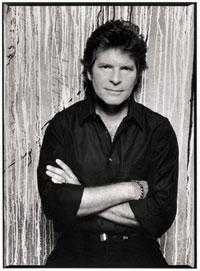The music of John Fogerty has always lent itself to a live setting. Just ask the uncounted bar bands who, for years, have kept the patrons placated with open-ended renditions of "Proud Mary" or "Born On The Bayou," "Green River" or "Bad Moon Rising." Here, obviously, is music meant to be heard up-close and in-person.
It's all the more ironic, then, that the man who has made some of the most spontaneously celebratory sounds the world has ever known should himself have been woefully underrepresented in the live recording arena. The documentary evidence of John Fogerty live can, in fact, be counted on the fingers of one hand: "Live In Europe," recorded during Creedence Clearwater Revival's 1971 continental concert tour and released two years later, after the group's demise; 1981's "The Concert," originally released as "The Royal Albert Had Concert" before the record company confessed it actually contained material recorded in Oakland, California in 1970; 1985's "John Fogerty's All Stars," an in-concert television special (never commercially released), along with, of course, the requisite muddy and muffled bootlegs making the record collector rounds.
For fans of authentic American rock 'n' roll, passionately and persuasively performed, it seems that the legend of John Fogerty's electrifying stage presence would remain just that – a you-shoulda-been-there tall tale told by veteran fans.
John Fogerty delivers the timeless essence of his music. A genuine showman, an entertainer dedicated to the proposition that every audience deserves his very best, John Fogerty on stage is a sight to behold and a sound to savor.
Fogerty undertook an extraordinary personal and creative odyssey following the release of his two solo comeback albums: 1985's "Centerfield" and 1986's "Eye Of The Zombie." It was a search that brought him both to a nurturing and supportive family environment with his marriage to wife Julie and to a musical rebirth as he explored the back roads and by-ways of the American South in search of his musical roots.
The results of that journey are brilliantly chronicled on "Blue Moon Swamp," his 1997 release and first new record of original material in more than ten years. Hailed as a true original's triumphant return to form, "Blue Moon Swamp" would eventually go on to garner the artist his first-ever Grammy for Best Rock Album of the year.
John Fogerty was honored as a composer, with the 1997 Lifetime Achievement Award from the National Association of Songwriters, and as an instrumentalist, with the Orville Gibson Lifetime Achievement Award. The music of "Blue Moon Swamp" also served as the basis for a solo concert tour that, at long last, returned this consummate guitarist, singer, songwriter and quintessential rock 'n' roll performer to the spotlight and landed him Performance Magazine's Theater Tour of the Year Award.
Fogerty's Blue Moon Swamp tour, which took him and his crack backing band across America and Europe, was universally hailed as the concert event of the season. "John Fogerty must have struck a deal with the devil," wrote Jim Farber in Now Entertainment. "Nothing else explains the supernatural perfection of his show." Wrote David Hinckley in the Daily News, "John Fogerty, in top voice, with a wonderful new band and a newfound depth to his guitar work, couldn't do a bad show any more than Michael Jordan could play a bad basketball game." "By the end of the evening," asserted Robert Hilburn in the Los Angeles Times, "John Fogerty had proven that he remains one of the treasures in rock."
